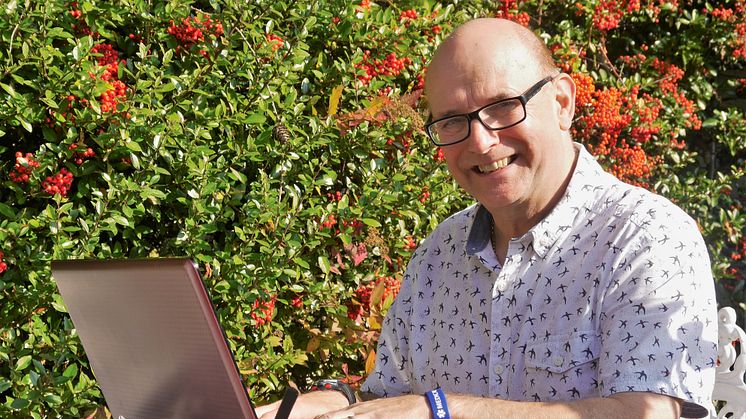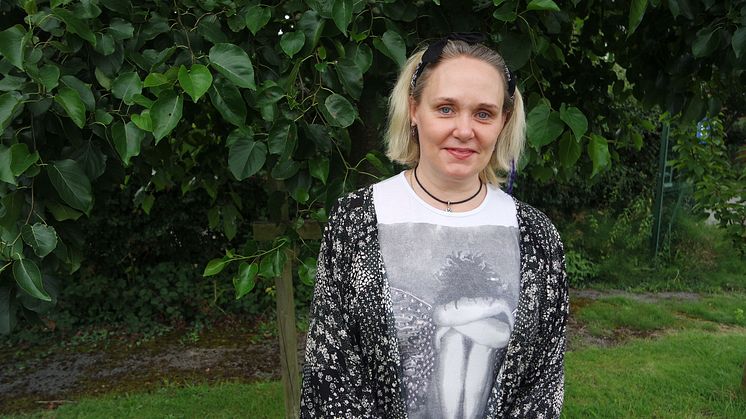
Press release -
Sutton Coldfield stroke survivor adds his voice to Lost for Words campaign
Sutton Coldfield stroke survivor, Andy Brown, 62, is one of the thousands of people who has had to overcome communication difficulties after a stroke.
Writer Andy went from a stroke survivor to published author in two years, despite living with a communication disability caused by his stroke.
Andy had his stroke in March 2015, caused by a blood clot on his brain. Initially, both Andy’s speech and coordination were badly affected and he had no sensation in his fingers. His speech was very slurred, and he was very confused.
Andy said: “The morning after my stroke, I attempted to write down questions to ask the consultant. I found it virtually impossible to grip the pen, and I couldn’t even spell the word ’scan.’. I remember trying to work out what the first letter was. Imagine, as a writer not being able to spell such a simple word. My note eventually resembled a childish scribble, full of mistakes and crossings out.”
By the time Andy was seen by the consultant, his condition had improved enough for him to get out of bed and after further scans, Andy was told he would be able to go home at the end of the day. When he was visited by the speech therapist, she reassured Andy that he could recover as long as he practiced and worked at his communication.
Andy said: “I was completely unaware and unable to grasp the extent of the challenges I now faced, or how I could regain the independence I had lost. I felt overwhelmed and very frightened at how life changing my stroke was going to be.”
His wife Karon insisted Andy practice regularly to regain his speech and movement. He added: “I did non-stop practices and Karon insisted I learned how to self-correct my speech whenever I stumbled over a word or phrase. My speech patterns were still very inconsistent and littered with mispronunciations. I made progress over the next few months, but needed frequent naps and had little stamina.”
After several months, Andy started writing again. He was about half way through the manuscript of his first children’s book. He said: “I couldn’t imagine how I could possibly finish it. At first, I made many typing and grammatical errors, but once again, Karon showed endless patience in reading my drafts and correcting them.”
In October 2016, Andy approached the Troubador Publishing Company, with a view to self-publishing his book. He submitted the manuscript for approval and was delighted when it was accepted for publication. Since the launch in June, William the Hedgehog Boy, is available from bookshops or as an ebook. There are reading events at Waterstones and Foyles in Birmingham, and also local libraries and schools are planned for later in the year.
Andy added: “In June I hosted the launch of my debut children’s novel, William the Hedgehog Boy. It involved addressing the audience and giving a speech, signing books and this happened just a few days after I had done a radio interview. Having the unwavering support of my wife throughout my rehabilitation and focussing upon finishing and publishing the book, has been invaluable to helping me make an excellent recovery.”

The Stroke Association’s Lost for Words campaign aims to raise awareness of the challenges stroke survivors with communication difficulties can face, and help and support available.
Sarah Adderley, Head of Stroke Support at the Stroke Association, said: “After a stroke, around one in three people like Andy have difficulty communicating, which can be both terrifying and isolating. But with the right help and support, many stroke survivors are able to find new ways to communicate, and can rebuild their lives.”
More than 350,000 people in the UK have aphasia, a communication disability which can be caused by stroke. The Stroke Association is urging people to show their support for stroke survivors who are lost for words and make a donation. For more information, visit www.stroke.org.uk/lostforwords.
Topics


